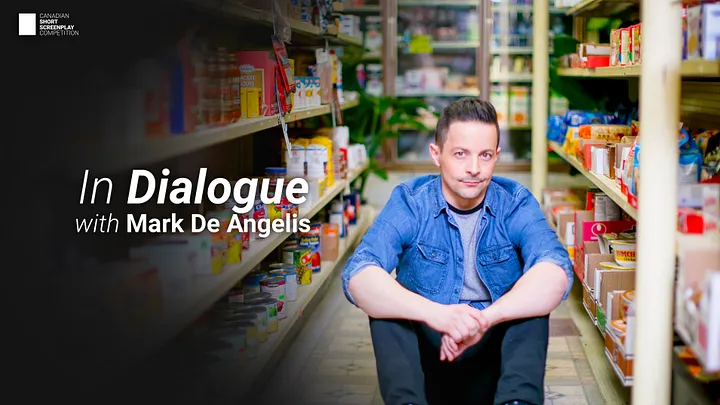Submissions are open for the 6th annual Canadian Short Screenplay Competition now until April 13th, 2025 via FilmFreeway.
Show us your perspective. Submit today.
2025 > In Dialogue: Mark De Angelis—The Screenwriter’s Journey
By Valeria Perea
26 Feb 2025

Crafting a screenplay is an adventure full of excitement and challenges. While there is no secret formula or a straight path to create the perfect script there are certain key aspects and philosophies that will help elevate your skills as a screenwriter. We had a chance to talk to Emmy award-winning screenwriter and producer Mark De Angelis (Oddsquad, Endlings, Space Janitors) to share his insights into the craft, offering valuable lessons for those looking to refine their storytelling skills and navigate into the screenwriting world.
Q: What are some key writing techniques or philosophies that have elevated your writing and how have these evolved over the course of your career?
MARK: Where to begin?! In addition to reading countless screenplays for inspiration, I also like to read books on screenwriting. One standout I would recommend: Elephant Bucks by Sheldon Bull (for those interested in the half-hour sitcom style). And this next recommendation isn’t a book, but more a philosophy of storytelling structure: Dan Harmon’s Story Circle (easily searchable online). No matter where you are in your career, I believe we can constantly learn things to elevate our writing. Whether it’s reading screenplays, books, or attending writing workshops in person or online (Corey Mandell is someone I highly recommend).
Q: What are some key writing techniques or philosophies that have elevated your writing and how have these evolved over the course of your career?
MARK: Where to begin?! In addition to reading countless screenplays for inspiration, I also like to read books on screenwriting. One standout I would recommend: Elephant Bucks by Sheldon Bull (for those interested in the half-hour sitcom style). And this next recommendation isn’t a book, but more a philosophy of storytelling structure: Dan Harmon’s Story Circle (easily searchable online). No matter where you are in your career, I believe we can constantly learn things to elevate our writing. Whether it’s reading screenplays, books, or attending writing workshops in person or online (Corey Mandell is someone I highly recommend).
Q: What’s the most critical element of a screenplay to define its success?
MARK: Something that makes you ‘feel’ something; whether it’s joy, fear, sadness, etc. Also, if you don’t have your reader hooked by the first ten pages, you’re toast.
Q: How do you manage creativity, discipline and the inevitable challenges in your writing process?
MARK: Discipline is one of the toughest things for me to manage. The nature of this business involves a lot of down time (read: unemployment). If you want to be successful in this business, you have to capitalize on that downtime to sharpen your skills. Whether that’s writing a new script, attending a writing workshop, networking, or all of the above. I try to set manageable writing goals for myself, with a clear timeline, as a form of discipline. It almost always fails miserably.
Q: Where do you typically find inspiration for your stories and how do you channel these influences into ideas that resonate with audiences?
MARK: Stories are all around us! Think of the stories you’ve heard (or experienced) amongst your circle of friends, your family, your work colleagues, or even personal romantic relationships. There is also a ton of inspiration to be found in watching TV, movies, live theatre, sketch comedy, stand-up comedy, etc. To be clear, I’m not suggesting you rip off story ideas. I’m talking about allowing yourself to see/hear a story that may spark an original idea for you. To the latter part of your question, if a story has real emotions and stakes, it will one hundred percent resonate with audiences.
Q: What themes, genres or types of stories do you find yourself most passionate about exploring? What is it about these narratives that speak to you so much?
MARK: For genre, I tend to steer towards comedy. As for types of stories, I have a soft spot for underdog stories. I think we can all relate to being an underdog at some point in our lives (unless you look like Brad Pitt or Bella Hadid, in which case this does not apply to you, please continue enjoying your immaculate life).
Q: How do you strike a balance between “Showing” and “Telling” in a script?
MARK: Whenever possible, always ‘show’ never ‘tell’. Here’s a great (albeit very simple) example…
That’s pretty powerful stuff that raises a bunch of intrigue for the viewers. The opposite would be her getting the text, turning to someone at the bus stop, and telling them she just got some really bad news. There are moments, of course, where you will need to “tell” for exposition purposes, but always push yourself to ‘show’ rather than ‘tell’.
Q: What strategies or principles do you follow to craft a compelling and unforgettable opening or ending of a script?
MARK: Your Protagonist should start the story in one place and end up in another. And I don’t mean geographically. I mean emotionally.
Q: How do you deal with feedback or criticism of your script, especially if it’s not what you expected.
MARK: First thing I do is curse. Next, I question my worth as a writer. Which is why I make it a rule to never, not ever, reply to feedback or criticism in the moment. You’re responding with a defensive posture. Instead, I suggest you read the feedback a couple of times and sit with the ideas raised for a day or two (should you have that time). With a cooler head, you’ll find yourself to be more open and receptive to the feedback, and as a result, better prepared to think of solutions.
Q: Looking back at the beginning of your career, what moments or decisions set you on the path to where you are today?
MARK: The most important thing I did early in my career was not sit around waiting for the phone to ring (side note: that phone was likely a Motorola flip phone). I actively looked for ways to get my foot in the door by working behind-the-scenes in television production. Whether as a PA, Production Secretary, or Production Coordinator. Those positions allowed me to learn valuable lessons about how the TV industry works, and eventually, those jobs also helped me forge connections with people who would hire me for writing work. The lesson here isn’t that you should all go work in television production. The lesson is to be proactive and do things to advance your career and/or bolster your CV — whether that’s hosting your own podcast, making TikTok videos, writing/performing sketch or stand-up comedy, creating a low-budget short film or web series, etc… Any of these things will help advance your career in immeasurable ways.
Q: For young screenwriters and producers seeking to break into the industry, what are the most valuable lessons you’ve learned that could help them navigate the complexities of writing and production?
MARK: Teamwork. Teamwork. Teamwork. Making television is such a collaborative process, with so many different players involved each step of the way. Things can get very complex, both from a writing and production standpoint, so keeping the key players united in terms of vision (and overall happiness) is the key to success. Start to familiarize yourself with the different roles and responsibilities of everyone on your team. From directors, to ADs, to producers, to DOPs, etc.. Understanding what they do to help you, will help you.
Q: What unique opportunities or growth experiences do you believe participating in screenplay competitions can offer emerging writers?
MARK: Firstly, a word of caution. There are sooooo many screenplay competitions out there and some of them are nothing more than cash grabs. Do your research to find reputable screenplay competitions (there are many) and then absolutely enter! A screenplay competition can be helpful for a couple of reasons. One, it creates a deadline for you to submit something (if you’re a procrastinator, this can really light that motivational fire). Two, if you’re lucky enough to win (or even place in the Top Ten) you can use this accolade when approaching literary agents for possible representation, or even production companies and networks to pitch your show. Winning a screenplay competition (or again, even placing well) can give you a great leg-up and an immediate ‘hook’ when pitching yourself and your script.
As our conversation with Mark comes to a close, one thing becomes clear; the art of screenwriting is a journey of continuous learning, resilience and passion. From finding inspiration in everyday life, to refining the balance of showing versus telling. Mark’s insights serve as invaluable guidance for aspiring writers. Whether you’re navigating the complexities of feedback, honing your discipline, or just looking to get your foot in the door, his advice gives light to the importance of persistence and collaboration. In an ever-evolving landscape, with A.I looming over the nature of authenticity, great storytelling forever remains at the heart of human emotion; with dedication, creativity and the willingness to grow. As Mark puts it,
“Your protagonist should start the story in one place and end up in another. And I don’t mean geographically. I mean emotionally.”
Just like our protagonists, we as writers must embark on journeys that shape us — growing, evolving, and emerging with new perspectives.
Mark De Angelis is an award-winning television writer and producer based in Toronto, Canada. Recent accolades include four Daytime Emmy Awards, an International BAFTA Award, six Canadian Screen Awards, and a Writers Guild of Canada Award. Mark was also inducted into the prestigious Playback Magazine’s Top 10 to Watch List (alongside CSSC Founder, David Cormican).
Submissions are open for the 6th annual Canadian Short Screenplay Competition now until April 13th, 2025 via FilmFreeway.
Show us your perspective. Submit today.

Brand Ambassador